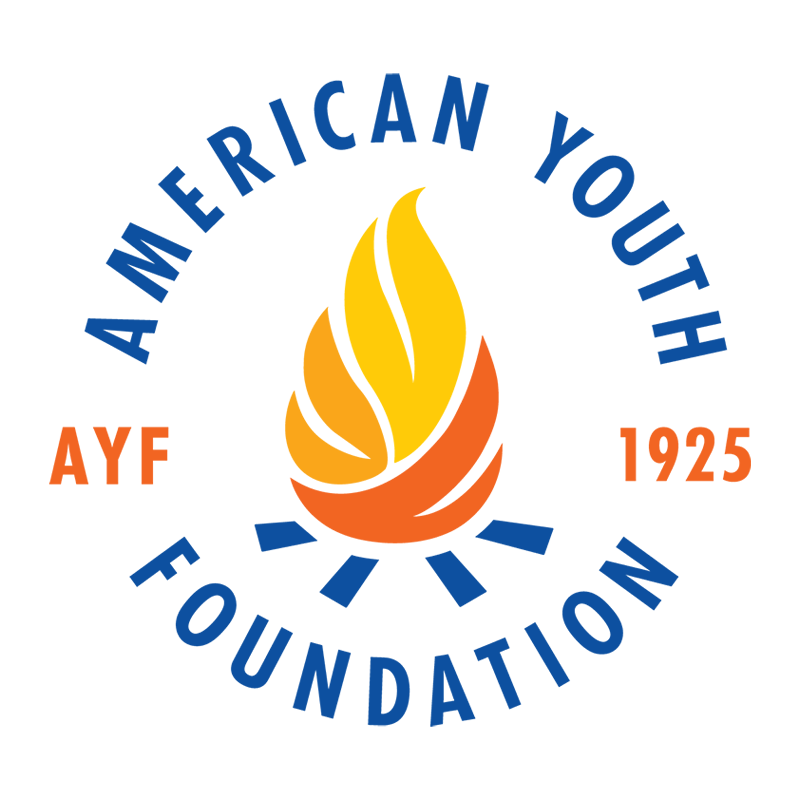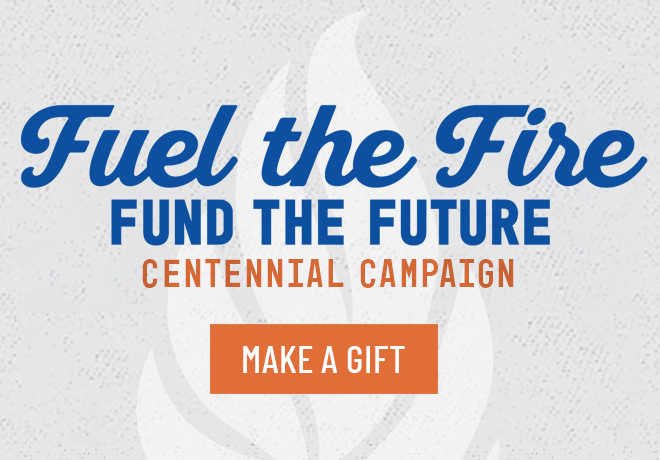Michael Harter’s career has always found him at the intersection of youth empowerment and mental health, a passion he credits to his own foundational experiences as an AYF participant. He’s always enjoyed working with young people, first in experiential education and then as a mental health professional.
He volunteered on the National Leadership Conference and Miniwanca Boys Camp staff until 2021, when he joined the full-time team as Boys Camp Director. This summer, he takes on two roles: Miniwanca Director of Programs and NLC Co-Director. Here, he shares what summer 2021 taught him, how he cares for his own mental health during the busy camp season, and the one game he could play every single day.
Your career has always reflected an interest in youth development, particularly mental health. When and how did you realize this was a field you wanted to work in?
I first went to college to become a teacher, but decided the classroom wasn’t the most fulfilling career for me. I started working for various camps and outdoor education centers and earned a degree in experiential education instead.
During the winter, I found work in a psychiatric residential treatment facility, where I used the games, and group activities from my youth empowerment work. I intended to find another outdoor education or camp to work at the following summer, but a decade later, I was still working with that same company, this time as a licensed therapist. I used my background in experiential education to create an intensive outpatient program where kids who needed help could come and enjoy the experience of treatment.
Why did you decide to return to the AYF full-time in 2021?
The AYF was instrumental in my own empowerment. The mission and vision of the organization opened the world to a 14-year-old from a small Midwestern suburb. The rocky trails of Merrowvista and the sandy paths of Miniwanca are home to some of the most transformative experiences and conversations in my life. I jumped at the opportunity to bring that community together again, to give back to another generation of founders, especially now. I was excited at the challenge summer 2021 presented, and I’m even more excited to take on a bigger program year in 2022.
What lessons did you learn during summer 2021 that you are applying to summer 2022?
I learned just how important experiences in community are to youth and how difficult it was for folks to rebuild our community. We celebrated that challenge together.
We learned the founders’ vision of a balanced life is more important than ever. Young people made incredible sacrifices for the greater good and carried a great deal of the burden of the pandemic. The weight of those sacrifices affected them so many ways. Youth empowerment means listening to what youth tell us they need, and we learned even through adversity and uncertainty, young people thrive.
I remember early in the 2021 camp session, I watched 85 young people playing on Bryant Field and knew we brought more balance to their lives. We all came back to Miniwanca to rebuild the community. Next summer, we will return ready to build ourselves and each other even more.
What is Miniwanca doing to support our community’s mental well-being this summer?
Our days are long – Miniwanca doesn’t see darkness in the summer until nearly 10 p.m. – and there is an instinct to pack as much into that time as possible. This summer, we are creating programs that allow folks more room for balance while at camp.
There are few experiences more therapeutic than reflecting on the Lake Michigan beach in late June, and I know many people who have come to life-shifting revelations at camp. While our staff are not therapists or mental health professionals, it is still important that we recognize those needs in young people.
In 2022, this means recognizing that mental and emotional health is at the center of their development and empowerment. We know young people need extra help and support for their own well-being. That’s why we are taking time to train and learn as an organization. We will have staff trained in LEAD Camp Mental Health Certification to make sure the youth in our care are supported while at camp and have the skills, tools, and networks away from camp to grow, too.
You are also one of three NLC co-directors this year. What did the AYF feel this co-directing team was the best option for conference this year?
NLC has been staffed by volunteers for as long as I can remember, and it’s only possible because of their dedication. Erin O’Brien, Beth Wilson, and I have worked closely together for years at NLC, and our strengths really complement each other.
Erin brings a background in education and curriculum development to the leadership team. Beth is a longtime small business owner who pushes the program to its highest potential. We feel we are a great team to help the community not just with the immediate needs of NLC 2022, but also to build for growth in the next few years.
NLC reaches teens at a pivotal time in their lives. What value do you feel NLC adds to their transition from youth to young adults?
We give young people capstone experiences. We build the conference around finding ways to empower young adults to find their own agency for change in themselves and communities. We also create an environment where young adults can build their values and find ways to become their best selves.
Having a community to explore and build with during this critical developmental stage is so important. Many participants find a lifelong community in their NLC class. They have adults in official mentor roles who can be counted on year-round, not just at Miniwanca. They have peers who provide empathy and support. The NLC community is powerful for youth when they are hungry for community and connection in new ways.
What are some of your favorite Miniwanca or NLC traditions or activities you look forward to each year?
One of my favorite things each summer is watching the progression from “stranger in a strange place” to “founder of camp.” Giving and exchanging founder medals is a favorite tradition, and I really like getting another so I can give it away. Now I get to give them away by the hundreds!
At NLC, some of my favorite moments are celebrating the accomplishments of the Second Year Quest. I love the bittersweetness of the last day of NLC, too. It is so rich with emotion and gratitude.
Miniwanca is a family affair in the Vogler-Harter household, and your three kids are also active participants in AYF programming. How have their experiences at camp affected their lives?
Even before their parents were employed by the AYF, the organization shaped who our children are today. Every year, even with such understanding of the programing, I’m astonished by their growth in a few short weeks. They are remarkable kids who can express their values, lead their peers, and better understand themselves and their place in the world because of their time at camp. We were afraid making camp a bigger piece of our family life would take away from the Miniwanca magic, but we couldn’t have been more wrong. They left camp in 2021 with the same giant smiles as they had every previous summer.
You wear many hats as Director of Programs and NLC Co-Director. How do you care for your own mental health and wellbeing, especially during the summer?
In the summer, I take time for gratitude in small ways daily. I try to stay present and participate in the community as much as possible. The fruit of my labor is the laughter and growth of youth in the program season. Being a part of that is so fulfilling.
I also make sure I take time to myself. I am a very introverted person, so small bits of solitude help me recharge. Sometimes that means a nap during rest hour, and sometimes it means standing in a field looking at stars in a rare moment of quiet.
In the off season, I love games and time with my family. Card games, board games, made-up games to complete chores – all kinds of games and play keep me in a positive mental space and able to be my best self. If every day could include game of cards, that would be perfect.
Self-care isn’t only about the fun stuff. Sometimes it’s taking the time to reflect on my own balance and how to fill my day with intention toward balance. It is impossible to be my best self if I am not caring for myself.

